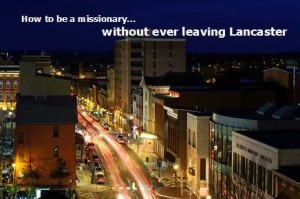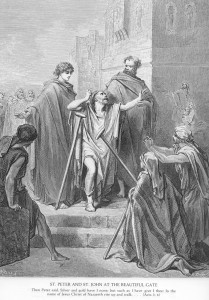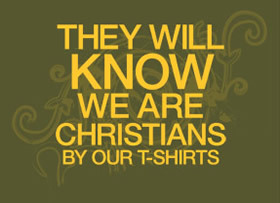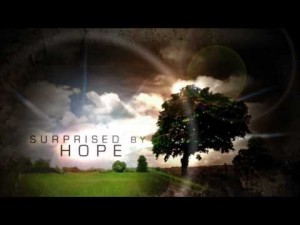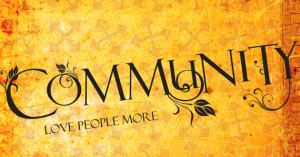 Below you'll find our sermon for week 6 of our How to be a missionary without ever leaving Lancaster where we have transitioned from Engaging Culture (the first step in missional church planting/being a missionary) to Forming Community (the second step in missional church planting/being a missionary) Would love to hear your thoughts, comments, etc..
Below you'll find our sermon for week 6 of our How to be a missionary without ever leaving Lancaster where we have transitioned from Engaging Culture (the first step in missional church planting/being a missionary) to Forming Community (the second step in missional church planting/being a missionary) Would love to hear your thoughts, comments, etc..
Today we make the first transition from the first part of our series entitled “How to be a missionary without ever leaving Lancaster, to the second part. During the month of June, we looked at the first part of being a missionary, or in planting a missional church/community, that of engaging culture. We spent time talking about being a blessing, out of Genesis 12:1-3. We spent talking about seeking the peace of the city, via Jeremiah 29:1-7. We talked about being sent as Jesus was sent, and rooting our sent lives in the Holy Spirit and how the spiritual disciplines of prayer, scripture reading, mediation, etc.. should drive us out into the world. Then two weeks ago we look at Paul’s missionary strategy in Athens as he walked around, carefully looking at their objects of worship. We then walked around our “Athens” of Lancaster city, and looked at objects of worship, and looked at where God is moving. And then finally last week we put engaging culture into practice by putting together 117 lunches, and giving them to people and praying for them.
So as I said we are transitioning from the first step of the missionary or missional flow to the second step of missional flow, that of Forming Community. So for the next 4 weeks we will be talking about community, the formation of community, the importance of community, the connection between engaging culture and community, and how to be in community with each other. We’ll also provide various events and activities that are geared at building community, and putting into practice what we have been talking about in June and July.
So today, as we enter into our discussion about forming community we’ll start with one of my favorite descriptions of the life of the early church. The description of how the early church did life together. This description of the early church’s communal life can be found in many places within the pages of the New Testament but especially in Acts 2:42-47.
Acts 2:42-47 says, “They devoted themselves to the apostles’ teaching and to fellowship, to the breaking of bread and to prayer. Everyone was filled with awe at the many wonders and signs performed by the apostles. All the believers were together and had everything in common. They sold property and possessions to give to anyone who had need. Every day they continued to meet together in the temple courts. They broke bread in their homes and ate together with glad and sincere hearts, praising God and enjoying the favor of all the people. And the Lord added to their number daily those who were being saved.”
So let’s unpack this account of the early church and see what we might learn, experience and apply to our context here in Lancaster over 2,000 years later.
Community Formation, from a Christian perspective should be built upon by a few different foundational elements. Community shouldn’t be the end all, be all, stand alone foundation. It needs other things along side of it, in order to truly build biblical community. Verses 42-45 spell out what those other foundational pieces of biblical community are. In verse 42 we see the early Christian church building community through being devoted to the apostles teaching, to fellowship, to the breaking of bread (which means in the celebrating of the Lord’s Supper, the bread and the wine representing the body and blood of Jesus spilled out for the healing of the world and our lives), and finally to prayer. And in verse 45 we see that mission is an integral part of building biblical community. We talked a while back about the concept of communitas, which is community on steroids and is developed when a community is on mission together, whether that is a church, a business, or a football team. All too often, the Christian church can put mission and discipleship on opposite ends of the spectrum, but according to Acts 2, both are of utmost value and of utmost importance in the formation of community.
Now at the beginning of our time together we played a trailer for the upcoming movie Lone Ranger. At the time I didn’t make any comment on it as to why I was showing it and the connection between the movie and our theme for today. But there is definitely a connection. You see too often we try to do life (whether it is the Christian life or just life in general) as Lone Rangers. But God literally designed us to be in relationship with others. From birth we have been designed for human interaction and love. We wither and die without love, human touch, and interaction. You see over a 100 years ago in the states 99% of babies in orphanages died before they were 7 months old. They died not for lack of food, water, or from sickness. No they just wasted away a condition called “marasmus.” They died from lack of touch, and when that was realized the trend was totally reversed. We can’t be a Lone Ranger Christians trying to follow Jesus into his mission into his world. We need each other. We can’t be Lone Ranger individuals, we absolutely need to be doing life with other people. (as a side note, we will be launching again a Missional Community this fall that seeks to help develop Community, among discipleship and mission. And we want to start one, grow, train leaders, and send out people to start more missional communities, but for now we’ll start with one…most likely on Tuesday night’s at Laura’s)
Besides being committed to the apostles teaching, to the fellowship, to the breaking of bread, to prayer, and to mission, what else helped the early church to form community that withstood the trials of the culture in which they lived? We see it in verse 46. “Every day they continued to meet together in the temple courts. They broke bread in their homes and ate together with glad and sincere hearts,” They met everyday. But look where they met? Both in the temple and in homes. They were actively involved in each other’s lives, not just when they met at the temple, but each and every day and in their homes. They not only met to break bread and remember Jesus (in communion) but they met to break bread (to eat together). Community, to them, wasn’t just a once a week thing. Community wasn’t a program to attend once a week, or a community group to be a part of. Community to the early church was a 24/7/365 existence. Now I’m not saying that all of us need to be together all the time, but we should work to build community, not on just coming here on a Sunday, but we should be engaging with each other, and inviting our friends (engaging culture part) into our community formation times of eating together, praying together, sharing together, having fun together (seeing movies, running together, Mt. Biking together, etc…) and the list can go on and on.
And so what was the end result of the early church forming community around the three values, that we seek to also live by? It can be found in verse 47, “And the Lord added to their number daily those who were being saved.” For the early church community formation wasn’t about the idea of us 4 and no more. They didn’t form community to make themselves comfortable, and to meet their own needs. Though their needs were met in the midst of the community formation work that was taking place all around the early church. No, the formation of community, and how the early church lived it out, was so rare, was so attractive, was found no places else, that it led to 3,000 people coming to a saving knowledge of Jesus. You see what you need to know is that the early Christian community was the only community that was inclusive. They included men and women, and had children in their midst. They include slaves and free. Jews and Gentiles. The rich and the poor. And probably any other social situation that you could think of and differences throughout. But they were still able to love each other and that they formed a community that caught the attention of all the people, earned them favor with all the people (as it says in verse 46) and led many to become disciples of Jesus.
So now the question becomes, can we in the 21st century live out such community formation that was found in the early church? Can we be devoted to the apostles teaching, to the fellowship, to the breaking of bread, to prayer, and to continue His mission in the world? If not, why not? If so, how? How can Veritas be a place that is reminiscent of the early church and it’s radical inclusiveness? What things can we do as a community, to build, form, and live out community (and not forgetting the engaging culture part of the missional flow)? It is to those questions that we’ll be unpacking together.
1. What questions, comments, insights, push back, thoughts, etc.. do you have regarding the message and/or the Scripture?
2. Do you think it is possible to live out Acts 2:42-47 in our context in the 21st century? If yes, how (concrete ideas). If not, why not?
3. From your standpoint, is the current American church like the inclusive early church? If no, why not? How can Veritas be an inclusive community (all the while holding onto the values that the early church lived out)?
4. What is God saying to you and what are you going to do about it?



